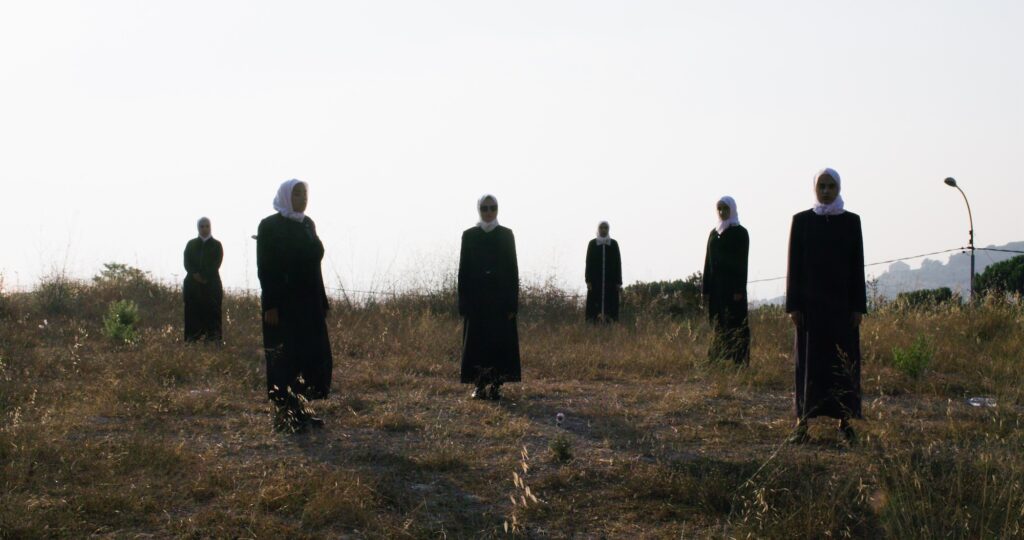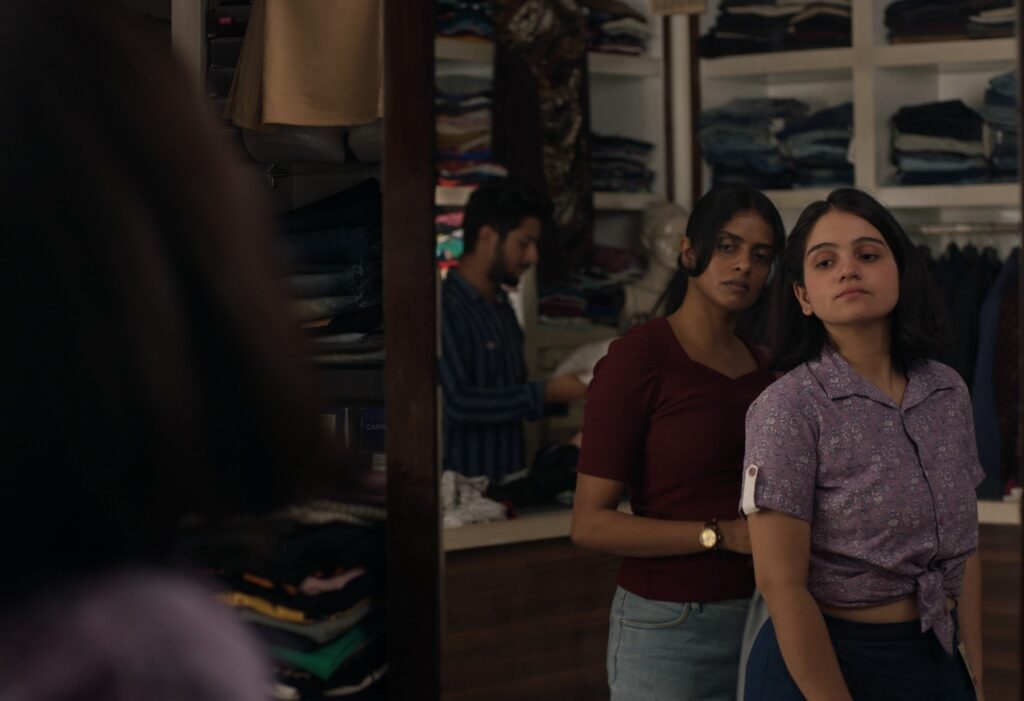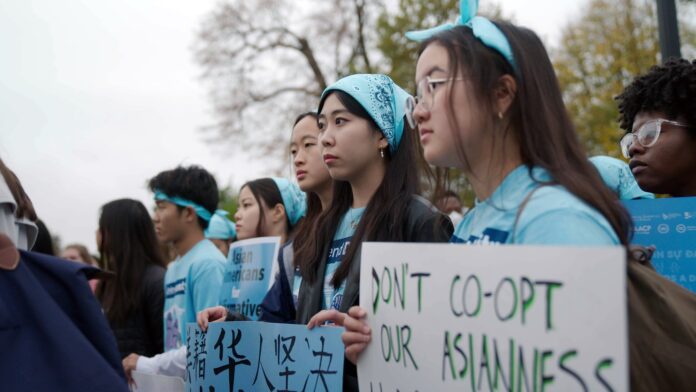What was until 12 years ago known as the San Francisco International Asian American Film Festival—since then it has, like several similar Bay Area events, shared the same name as its producing institution—has long had an unusually close relationship to much of what it programs. That’s because its founding organization the Center for Asian American Media or CAAM (formerly NAATA) was created to help mentor, develop, fund, produce, distribute, and promote work by and about Asian heritage peoples in film and television. So in one way or another, its footprint is on a great deal of the content and careers that have represented that demographic in public media over the last 40-plus years—spurring levels of growth over that span that would have been unthinkable earlier, without its advocacy.
CAAMFest 2024, which opens Thu/9 and runs through May 19 at various SF and Oakland locations, shows the fruits of that influence, not least because several of this year’s spotlit films are from makers previously involved in its fellowship or mentor programs. (Several also received direct funding.) Running alongside the public screenings this first weekend is an Industry Hub and Filmmaker Summit whose industry panels, seminars, and other activities at Four One Nine Gallery—all free, though RSVP is required—are designed to help launch the next generation of Asian American visual storytellers.
The opening night feature at the Palace of Fine Arts wades into a particularly complex and thorny US political issue. Hao Wu and Miao Wang’s Admissions Granted chronicles the perhaps-surprising stance taken by some Asian-American plaintiffs and activist organizations towards affirmative action—surprising because their lawsuits (against sought-after institutions like Harvard) seek to dismantle it. The argument is that this particular minority is being punished for academic excellence, granted lower admittance than GPAs or other testing standards would otherwise allow so that other groups also be represented in enrollment…thus diversifying the campus, and by extension our political, professional and social landscapes.
Is this “reverse discrimination”? Race is only one criteria looked at by admissions boards. But would eliminating it entirely level the playing field, creating a “true meritocracy”? Or would it simply restore an old status quo in which only (mostly white) students of privileged backgrounds can access elite schools?
The thorny nature of this debate is further complicated by the fact that the lawsuits are largely being driven by one Edward Blum, a well-funded longtime neocon legal crusader some suspect of using Asian-Americans simply as a Trojan Horse on this issue. He allows the filmmakers generous personal access, apparently confident that he comes off as a charming, common-sensical champion of “fairness” in “equal education rights.” After about an hour of his smug, smiley whitesplaining, I was fit to be tied. But Admissions Granted provides an evenhanded and provocative look at an issue with valid arguments on all sides. After the 6:30pm screening, there will be an opening night gala party at the Asian Art Museum.

Two “Centerpiece” selections, showing on successive Saturday afternoons at SFMOMA, provide insight into very different kinds of female experience. Jude Chehab’s Q is a documentary that’s personal and then some: Her mother Hiba has long been involved in a Lebanese branch of the Qubaysiat, a somewhat secretive, women-only Islamic revival group.
Despite her own occasional fallings-out with them (and particularly with a charismatic leader), Hiba has let that involvement dominate her life—a loyal if wearily philosophical husband admits she’s been “married” to it more than to himself. We don’t get much insight into the beliefs or workings of the sect itself. But we do glean how it has impacted Hiba for better and for worse, while also having a sometimes-attracting, sometimes-alienating effect on her children.

A contrastingly very secular story is told in Shuchi Talati’s first feature, the fiction narrative Girls Will Be Girls, which won an audience award at Sundance. Reminiscent of such skillful coming-of-age tales as An Education, it is the rare Indian feature (albeit from a US-based writer-director) to deal with a female adolescent’s sexual awakening. That subject is not depicted in graphic terms, but with a clear-eyed frankness that’s bracing nonetheless. 16-year-old Mira (Preeti Panigrahi) is an ambitious, self-possessed student at a boarding school in the Himalayas, such a natural leader she gets appointed as the first-ever head prefect not chosen from the boys’ side. (It’s only a recent development at this very traditional, English-style institution that boys and girls are allowed to mix at all.)
But her head is turned from scholastics by the arrival of a new pupil, tall, handsome, worldly Sri (Kesav Binoy Kiron). Their mutual attraction soon creates a minefield of potential problems–with the administration, with fellow students, and with Mira’s protective mother Anila (Kani Kusruti). The risks grow worse once our heroine ticks off some of the senior boys, reporting them for taking “upskirt” photos. Their furious reaction, and the weak official response, underlines that despite all surface nods to equality, when push comes to shove this upscale social microcosm remains very much a man’s world. It’s a perceptive, first-rate drama and an auspicious directorial debut.
The bulk of the festival program likewise runs an international gamut. A sidebar for narrative features from Hong Kong includes Ray Yeung’s All Shall Be Well, which won the Teddy Award (for best LGBTQ film) at the Berlin Festival this year. Another dedicated to Pacific Islanders and Indigenous legacies has John Harvey’s Shall We Rise, a nonfiction flashback to 1972, when activists pushed Aboriginal rights to the forefront of Australian public and political consciousness.
CAAM’s general documentary category throws light on U.S. hate crimes against Muslims (36 Seconds); personal examinations of multi-generational family issues (Light of the Setting Sun, The Taste of Mango); a stubborn fight for the environment in repressive Myanmar (Above and Below the Ground); women excelling in rock climbing (Ashima), basketball (Home Court) and the arts (Nobuko Miyamoto: A Song in Movement).
The main narrative section encompasses culture-clash drama in Jean Shim’s A Great Divide; a very meta comedy in which filmmakers play themselves, kinda-sorta (Extremely Unique Dynamic); a glimpse of life in China’s fast-disappearing Uyghur culture (Nikah); Julian Pham’s Oakland-set Owl; sly satire of the Cantopop scene (The Lyricist Wannabe); and fictive portraits of unlikely female bonding (Meeting You, Meeting Me) and difficult coming-of-age (Smoking Tigers).
Seven dedicated shorts programs include those themed around horror (“Carnage”), queer content (“Out/Here”), ‘toons (“Animontage”) and community leadership (“Lionhearted”). There are also offscreen events focused on food (“Futurist Flavors”) and music (“Directions in Sound”).

The official closing night selection on Sat/18 at SFMOMA is And So It Begins from Ramona S. Diaz (A Thousand Cuts). It provides a front-row seat to the 2022 Philippine Presidential campaign of former VP Leni Robredo, whose liberal candidacy unfortunately faces an uphill struggle following up the term of one populist autocrat (Rodrigo Duterte) while competing against another (Bongbong Marcos, son of dictator Ferdinand). These men are horrible, champions of corruption, disinformation and anti-democratic rule. Unfortunately, they are also the direction in which the popular vote now tilts.
Trying to craft an inspirational story out of a losing battle (while also devoting space to crusading journalist Maria Ressa, the subject of Cuts), Diaz sometimes seems at a loss to pull her pile of rally, media and behind-the-scenes footage into a coherent statement. Still, And Soprovides more chilling proof that fascism seems to be the rising political flavor of preference around the world, and that resistance is desperately needed.
CAAMFest 2024 runs Thurs/9-Sun/19 at SF venues including SFMOMA, Roxie Theater, Great Star Theater, Palace of Fine Arts, plus Oakland’s New Parkway Theater. For full program, schedule and ticket info, click here.







